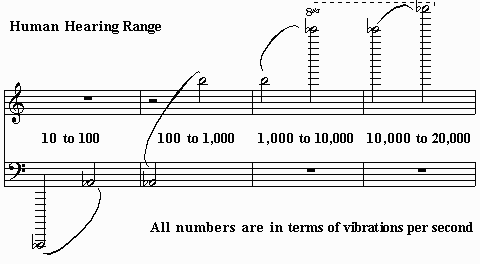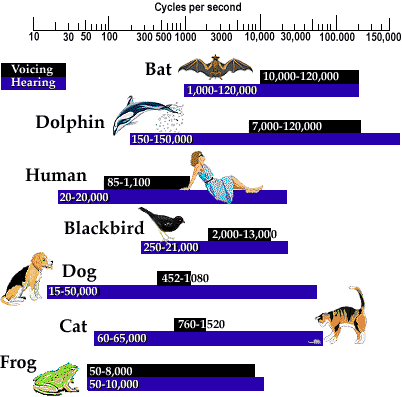


| Title: | Location | K-4 | 5-8 | 9-12 | Description | Discipline |
| Pitch | SoundGarden | How low or high can you hear? |
TIP: although you can use the speakers on your multimedia computer, a Make sure the volume isn't too loud!

 (30") – listen to this series of sounds, it starts with a pure tone vibrating 10 times per second, and rises in equal values until it reaches 100 vibrations per second.
(30") – listen to this series of sounds, it starts with a pure tone vibrating 10 times per second, and rises in equal values until it reaches 100 vibrations per second. (30") – listen to this series of sounds, 100 to 1000 vibrations per second.
(30") – listen to this series of sounds, 100 to 1000 vibrations per second. (30") – listen to this series of sounds, 1,000 to 10,000 vibrations per second. [NOTE: you'll need to download the entire sound file first. If you hear distortions or noise it is due to the limitations of your computer's sound system, not the sound file!]
(30") – listen to this series of sounds, 1,000 to 10,000 vibrations per second. [NOTE: you'll need to download the entire sound file first. If you hear distortions or noise it is due to the limitations of your computer's sound system, not the sound file!]
Do your friends or classmates hear these sounds the exact same way as you? What's the same? What's different?
How do other creatures' hearing range and speaking range compare to people?

[ Point and click on a creature above to hear its voice. ]
Did you know that your ear is also sensitive to small changes in pitch? There's a range called the just noticeable difference that covers the smallest increase in pitch people can hear. It's very small, about .3% (for example, the difference between 100 and 100.3 vibrations per second. A violin's vibrato is larger than this)!
What else might you need to you hear higher or lower sounds? Bigger ears, smaller ears, longer nose? What do these creatures have that are different from people like you?
What's the point?
Pyschologists use the term pitch to describe sound as a sensation or perception in our minds. Physicists use the term frequency to describe sound as a physical phenomena.
The psychologist's definition describes sound as "the attribute of auditory sensation by which sounds can be ordered on a musical scale." It deals with the perceived effect of hearing a series of vibrations by a listener (you!).
The physicist's definition describes sound as "an organized movement of molecules caused by a vibrating body in some medium – water, air rock or whatever." It deals with the creation or cause of a series of vibrations.
So there are two basic ways of understanding sound, one as a cause and the other as an effect. There is also a wide range of frequencies that we are sensitive to. Once sound gets too low we actually feel it, if it's loud enough. Once sound gets too high it seems to shrink and simply disappear from our notice.
Can you think of a sound that you've felt, like a truck passing by, a thunderclap, or an earthquake? What else?
Just for Fun!
What are some different ways to describe sound?
Snap your fingers, click your tongue, whistle, hum, sing, tap your foot, clap your hands, drop a pencil, pick up the pencil.
How would you describe the sounds these things make? High, low, skinny, heavy, bright, dull, sharp? What other words or terms would you use to describe these sounds? Make a list and compare them to a friend's.
What's the difference between a musical sound and noise?
What is your definition of a musical sound? What is your definition of noise?
Listen to these mystery sounds. Do they fit your definition of a musical sound and noise?
 (05") – listen to mystery sound #1.
(05") – listen to mystery sound #1. (09") – listen to mystery sound #2.
(09") – listen to mystery sound #2. (05") – listen to mystery sound #3.
(05") – listen to mystery sound #3. (08") – listen to mystery sound #4.
(08") – listen to mystery sound #4.
How do you define musical sound now? How do you define noise now? What other experiments might you try to determine musical sounds compared to noise?
"Music is the crystallization of sound."
– Henry David Thoreau
Send your comments to: webteam@cafemuse.com
© 1996 – 2013 NewWorldView, All Rights Reserved.